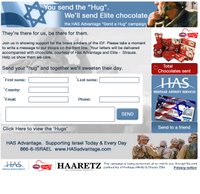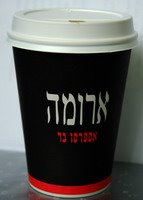 Be Sweet with Elite to the IDF
Be Sweet with Elite to the IDFThe news today is far from sweet – no disarmament (let alone defeat) of Hezbollah in sight.
As usual, the Forces Outside are ganging up again against us, Israel, once again.
Well, we are used to it – we have been blamed for everything under the sun, including the death of Princess Diana.
I agree, the UN accident was unfortunate, but weren’t they supposed to keep the peace? And not move from their location?
And Mr. Anan, before you trash us again in global media court, could you please wait for the investigation to end?
BTW, aren’t you and your son under investigation for fraud?
Or are you hiding behind “innocent until proven guilty?”
You have a flexible yardstick, don’t you Kofi Dear?
Going back to the sweet issue at hand, Israeli chocolate maker Elite has launched a great campaign.
Together with the Heritage Affinity Services credit card, they created a special webpage where you can click to send a personal message of support and a chocolate bar to an Israeli soldier for free.
It will take 24-hours for your message to appear on the website – Cyberterrorism of our Arab cousins and other anti-Semite ignorani is rampant.
Please be a mensch and send a chocolate bar and your personal message – it’s only a mouse click away!
http://www.websense-media.co.il/has_200706/default.asp?gid=friend




